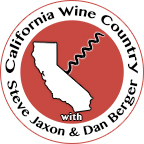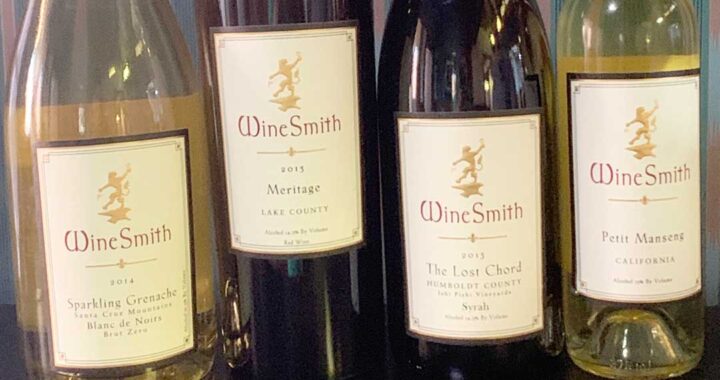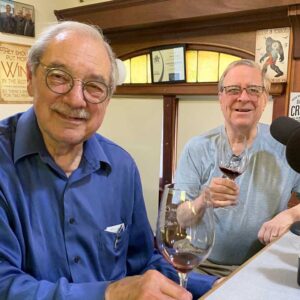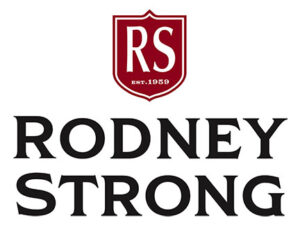Podcast: Play in new window | Download (Duration: 37:11 — 17.0MB) | Embed
Subscribe: Apple Podcasts | RSS | More
WineSmith Clark Smith has brought four unique wines on to California Wine Country with Steve Jaxon and Dan Berger today. Clark Smith’s last appearance on CWC was this episode of last March, when he talked about pairing wine with music. WineSmith is Clark’s label for personal projects.
This live show ran a bit long, so the portion of the conversation dealing with Clark Smith’s early career, from MIT to starting in the wine business, is here on this other podcast episode.
The wine marketplace is in serious downturn. Dan Berger notes that every ten to fifteen years or so there is a recurrence of Prohibitionist thinking, people saying not to drink anything. A former Yale professor wrote about this phenomenon. Dan notes another factor, which is alternative beverage which are giving consumer more choice.
Clark Smith explains that there are really two wine industries. 95% of the market is for mass market consumption and is not very good. It is meant to be “run of the mill” and not excellent. The other five percent of wineries are struggling to make wines that are “interesting.” Clark’s market is the consumer who is interested is something other than the kind of inexpensive wines found in supermarkets.
This is even true about the beer industry. Take the example of Russian River Brewing Co. which makes beers that are “interesting” which are driving their success.
Today’s Cellar Wine Tasting
Today’s cellar wine is a 2022 White Haven Sauvignon Blanc from New Zealand. It did not have sufficient acidity and has not aged particularly well.
They turn to a WineSmith sparkling wine made of Grenache. A lot of champagne used to be really sweet. The Grenache taste of strawberries and the vineyard character of honeydew melon. Grenache is usually made into a red or rosé. You typically don’t see white sparkling Grenache, like this. A little baked bread component in the nose, and some minerality in the aftertaste. Even with Dom Perignon so-called brut has 1.5% sugar. Brut Champagne was made to respond to English market demand for less sweet wines. One Champagne maker supposedly said that only brutes would like it that way, hence the name “brut” which has stuck around.
WineSmith owns no vineyards but Clark Smith has good long-standing relations with many growers. His website states that growing great grapes is a full time job so he is happy to let others do it. Everything WineSmith makes is experimental, says Clark. With the market the way it is, with people looking for something different, Clark is well positioned to provide the novelty that demanding consumers want.
No New Oak for Clark
Clark also owns no barrels that are less than 20 years old. The new oak adds too much oak flavor. That’s when people can say that the wine tastes like wooden furniture.
Words of wisdom from Clark: “Wine is fundamentally mysterious. Understanding wine is the booby prize.”
One of Clark’s labels has content that can only be seen under a black light. It costs $75 so with the purchase they throw in a black light flashlight.
Dan Berger wants to write a book on wine myths. It’s complicated because there are PhDs who believe in myths. Since Clark knows the.chemistry, where Dan does not, they might have to collaborate on the book. Clark uses the technical term “out to lunch” to describe some examples of that.
Dan is writing a book about American wine regions. There are great wines coming from states that were never known for wine, especially cold climate wines. Michigan is an example. Dan mentions Iowa too. Iowa also produces La Quercia prosciutto, which Clark says is excellent.
Clark uggests we find a documentary film out there called Wine Diamonds, that tells the story of five American families that are producing interesting wine.




